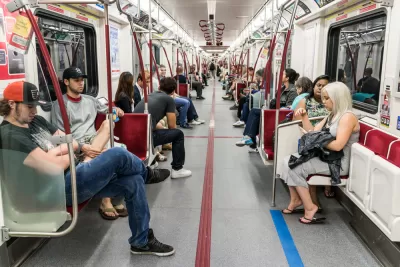A discussion of private and public space, revealing an argument for justice.

Density matters.
Which is why cities matter.
We exist physically; we go places and do things bodily, and the likelihood we're going to run into other people to generate new things in new combinations is vastly improved by the density that characterizes cities—in densities that are configured to be more conducive to sociability.
There can be too little density, or too much. No one knows what the right amount is. It's not a science—even if there's a tendency to put numbers to floor area ratio or people/jobs/units per hectare in a bylaw, but you must start from something. There's better density—but a plethora of cities fail that test, yet are loved by its residents.
Some might say the internet has made cities less relevant. Social media does facilitate all sorts of long-distance interactions and acquaintances that otherwise would never be, but they tend to be based upon mutual similarities of pre-established personal characteristics and interests, and actively pursued through those commonalities. The web tends to orient us toward what we're looking for. We're fed what we want to be fed.
Conversely, encounters in socially-oriented, densified cities offer far more happenstance opportunities, and thus far more likely to bring differences into contact and interplay. Cities bundle culture-making people and peoples (what we're intended to be), which can lead to novel creations. Bundling is supposed to spawn further cultural manifestations, and mutation. That's assuming there's any difference among us; hence the culture(s) of the city, the people it attracts, and whether it encourages or discourages certain activities, certain behaviours, certain expressions.
A dense city, can nonetheless reduce our differences so central to creation. Consider the precipitously declining cultural vitality of those cities undergoing such rapid and extreme gentrification that they are effectively banishing the presence of all but a narrow class of like-minded privileged inhabitants, meaning density becomes nothing more than opportunities for same to encounter same. Provided there's people there at all. Some cities, or parts of cities aren’t even for people anymore, but rather an even more privileged class of non-people called capital (Vancouver? San Francisco? London?).
Just as the culture of a city can be so socially-averse, since being social invariably entails a willingness to encounter and accommodate the unfamiliar, as to dissuade new combinations and creation, resulting in a culturally enervated density where sure, people cross one-another's paths, but they don’t interact much upon doing so and don’t have much to share when they do.
"How are you?"
"Busy."
All the right density in the developer’s bottom-line won't make for an interesting urban culture when those densely clustered together in starchitect/gold plated buildings aren't themselves interesting or, more commonly, are dissuaded from having or sharing interests.
Steven Snell is a professional urban planner focusing on biodiversity conservation. He has a master’s degree in urban design and is a novelist of The Undergraduates. Connect with him on Twitter @stevenpsnell or Facebook stevenpsnell. The views expressed are purely those of the writer and may not in any circumstances be regarded as stating a position of his employer.

Rethinking Redlining
For decades we have blamed 100-year-old maps for the patterns of spatial racial inequity that persist in American cities today. An esteemed researcher says: we’ve got it all wrong.

Montreal Mall to Become 6,000 Housing Units
Place Versailles will be transformed into a mixed-use complex over the next 25 years.

Planetizen Federal Action Tracker
A weekly monitor of how Trump’s orders and actions are impacting planners and planning in America.

Texas, California Rail Projects Seek Out Private Funding
In the wake of Trump’s cuts to high-speed rail projects, rail authorities are looking to private-public partnerships to supplement their budgets.

Addressing Rural Homelessness in Kentucky
A Kentucky Lantern series focuses on the challenges unhoused Kentuckians face and efforts to provide support and assistance.

Santa Clara County Dedicates Over $28M to Affordable Housing
The county is funding over 600 new affordable housing units via revenue from a 2016 bond measure.
Urban Design for Planners 1: Software Tools
This six-course series explores essential urban design concepts using open source software and equips planners with the tools they need to participate fully in the urban design process.
Planning for Universal Design
Learn the tools for implementing Universal Design in planning regulations.
City of Camden Redevelopment Agency
City of Astoria
Transportation Research & Education Center (TREC) at Portland State University
Regional Transportation Commission of Southern Nevada
Toledo-Lucas County Plan Commissions



























